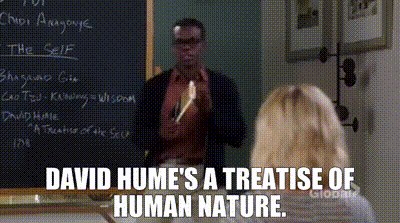Philosophy 322:
Syllabus

SPRING 2023 -
DR. KEITH KORCZ
Course Details:
PHIL 322 History of Modern
Philosophy
|
Section 001 |
3 credit hours
|
Prerequisite: ENGL 101 |
| MW 2:30 – 3:45 |
Griffin
Hall, HLG 505 |
How To Reach Professor Korcz:
You are supposed to have questions!
Ask them! In addition to class, here are some good times to do so:
My office is in H. L. Griffin Hall, rm. 563. My office hours are
MW 11:00 – 12:00, 1:00 – 2:30, 3:45 – 4:15, Th 12:00 – 3:00, F
11:00 – 12:00. We can also meet at other times by arrangement -
just ask. The best way to contact me is by e-mail at
keithk@louisiana.edu. My
office phone number is (337) 482-6806.
About the Course:
We are covering the theories of
knowledge and the world of the major philosophers of (roughly)
the Enlightenment era in Europe, from about the middle of the
17th century through the end of the 18th century. As Europe
emerged from the Dark Ages, some of the most important books in
the history of Western philosophy were written, and these are
our readings. Though no philosopher endorses all their views,
these books are the point of departure for many of the issues
discussed in contemporary philosophy.
Required Texts:
nota bene: Be sure to get
these editions and no other! We’ll be using them in class.
1. Rene Descartes, Meditations on First Philosophy,
Edited by Andrew Bailey, tr. by Ian Johnston (Broadview Press
1646/2013), ISBN: 978-1-55481-152-6.
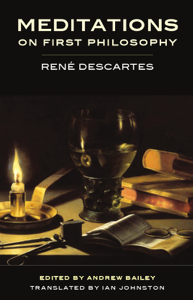 2. John
Locke, An Essay Concerning
Human Understanding, (Abridged), ed. by Kenneth
Winkler, (Hackett Publishing, 1689/1996), ISBN:
978-0-87220-216-0.
2. John
Locke, An Essay Concerning
Human Understanding, (Abridged), ed. by Kenneth
Winkler, (Hackett Publishing, 1689/1996), ISBN:
978-0-87220-216-0.
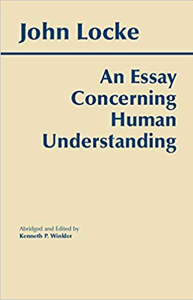 3. George
Berkeley, Three Dialogues
Between Hylas and Philonous, Edited by Jonathan Dancy,
(Oxford University Press, 1713/1998), ISBN-13: 978-0198751496.
3. George
Berkeley, Three Dialogues
Between Hylas and Philonous, Edited by Jonathan Dancy,
(Oxford University Press, 1713/1998), ISBN-13: 978-0198751496.
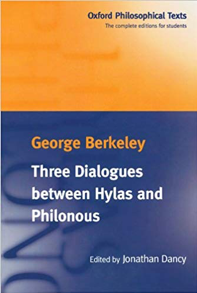 4. G. W.
Leibniz, Discourse on Metaphysics and Other Writings, edited by
Peter Loptson, (Broadview, 17th - 18th century/2012), ISBN:
9781554810116.
4. G. W.
Leibniz, Discourse on Metaphysics and Other Writings, edited by
Peter Loptson, (Broadview, 17th - 18th century/2012), ISBN:
9781554810116.
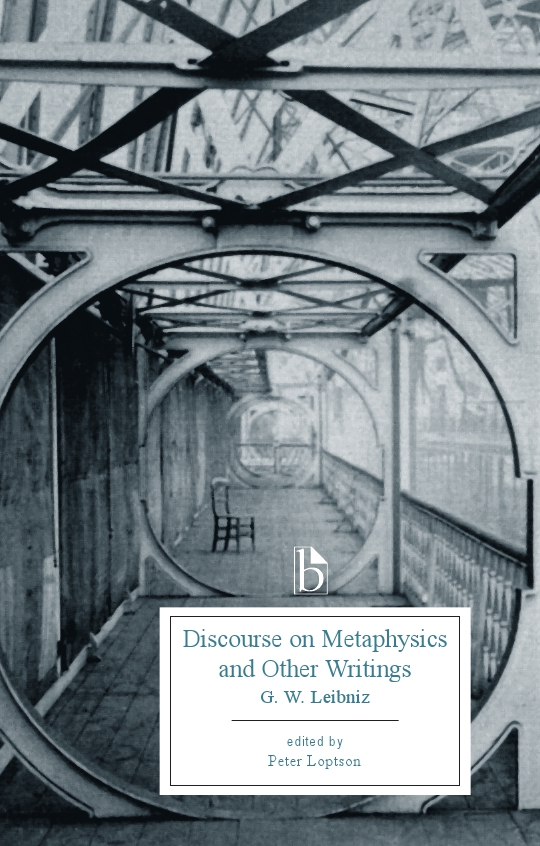 5. David
Hume, An Enquiry Concerning
Human Understanding, edited by Tom L. Beauchamp,
(Oxford University Press, 1748/1999), ISBN-13: 978-0198752486.
5. David
Hume, An Enquiry Concerning
Human Understanding, edited by Tom L. Beauchamp,
(Oxford University Press, 1748/1999), ISBN-13: 978-0198752486.
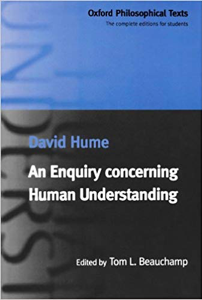 6. Immanuel
Kant, Prolegomena to Any
Future Metaphysics, Revised (or, Second) Edition,
Edited by Gary Hatfield, (Cambridge University Press,
1783/2004), ISBN: 9780521535359.
6. Immanuel
Kant, Prolegomena to Any
Future Metaphysics, Revised (or, Second) Edition,
Edited by Gary Hatfield, (Cambridge University Press,
1783/2004), ISBN: 9780521535359.
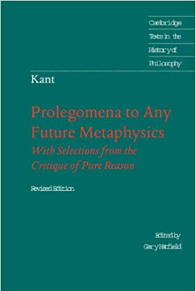 7. "History
of Modern Philosophy" Course Pack (available only via the Moodle
course page).
7. "History
of Modern Philosophy" Course Pack (available only via the Moodle
course page).
Your Course Objectives:
This course is designed to give you
an opportunity to
(1) further develop your reading comprehension, philosophical
writing, and argument evaluation skills,
and to acquire, at an introductory level, an understanding of:
(2) how concerns about the nature and possibility of knowledge
shaped modern philosophical systems,
(3) the motives of modern philosophers’ accounts of the mind and
the problems those accounts face,
(4) modern philosophical theories of the general sorts of things
that exist and the problems those accounts face,
(5) the diversity of historical and cultural perspectives and
their significance in the past and for the present,
and
(6) how the re-evaluation of the work of the Ancient Greek
philosophers revolutionized the Western world.
Achieving Your Course Objectives:
Exams:
There will be two in-class exams during the semester,
each worth 20% of your course grade, and a cumulative in-class
final exam worth 25% of your course grade. The in-class exams
will consist primarily of short answer and multiple-choice
questions. However, all make-up exams will be primarily essay.
The exams will cover both lectures and assigned readings
(material in lectures and assigned readings will not always
overlap). All exams are closed book/closed note. The exams are
designed to help you achieve all of the course objectives.
Paper: The term paper
will be done in successive drafts, the first draft being worth
10% of your course grade and the final draft being worth 25% of
your course grade. The paper must be at least 12-15 pages in
length, and will be described in more detail on a separate
handout. The paper assignment is designed to help you achieve
objectives 1 and, variously depending on your chosen topic,
objectives 2, 3, and/or 4.
Reading and In-Class Note
Taking: Though not separately counted for points, these
are essential to achieving all of your course objectives,
especially objective 1. You should complete each of the readings
before they are discussed in class. Some of the readings are
difficult, and you may find that you don’t feel you are getting
much out of them on your first read. That’s normal – read
through them anyway. Although we will go over them in class,
don’t just rely on that. Struggling through the readings and
then seeing them explained does a lot more for your skill
development than merely hearing the readings explained. Also,
don’t assume that because something is written, it’s true –
maybe it is, maybe it isn’t.
Grading:
The course grades will initially be
determined according to the standard scale, i.e., 90-100% = A,
80-89% = B, 70-79% = C, 60-69% = D, 59% and below = F, and then
may be modified as follows: Course grades might be curved, but,
if so, the curve would not be such that any student's grade is
lowered. Such factors as improvement over the length of the
course, class participation, attendance, etc., may be taken into
consideration, especially when doing so may improve a borderline
grade. You must complete all course assignments (namely all
three exams and both drafts of the paper) to receive a passing
grade (i.e., a grade other than F, NC or U).
Class Policies:
Missing Class: If you must miss class, for
whatever reason, it is your responsibility to get class notes from
another student. If you wish your absence to be excused, promptly
provide me with an appropriate excuse, e.g., illness requiring
medical attention, participation in certain university-sanctioned
events, dangerous weather, etc. We cover something important every
day, so for every four unexcused absences or partial absences,
your course grade will be dropped by a letter grade. Skip class,
and you won’t pass!
Late Assignments: If you miss an assignment due date, you
must notify me within one week of either the due date or the
cessation of a medically documented persistent vegetative state in
order to make up the assignment. Missed assignments can be made up
for full credit only if an appropriate excuse is promptly
provided. An unexcused late assignment will be dropped 2/3 of a
letter grade per day it is late.
Classroom: In class discussions, it is perfectly fine to
disagree with your classmates or myself, but you should do so
respectfully and with reasoning. Philosophy is all about
intellectual controversy! However, disruptive or persistent
distracting classroom behavior may result in your being asked to
leave (counted as an unexcused absence) or being dropped from the
class, at my discretion. On those very rare occasions where you
absolutely must arrive late to class, see me at the end of class
so I can mark you present.
Ethics Policy: All assignments for this class must be
completed individually, and any instance of academic dishonesty
(e.g., cheating, plagiarism, furnishing false information
regarding absences, etc.) will be sufficient to fail the course.
Unauthorized Websites: Neither lectures nor any class
materials may be posted on the internet or otherwise published.
Students who rely on internet sites (other than my own, listed
below) or search engines for class notes, quizzes, study guides,
etc., tend to do poorly in my classes. Such sites are often
unreliable, and they prevent you from acquiring valuable note
taking, study, and learning skills that you will need after you
graduate. Do not use them.
University Policies: Be sure you are familiar with all
university policies described in the UL Lafayette Undergraduate
Bulletin and Code of Student Conduct.
Disability Accommodations:
Students needing academic
accommodations for a disability must first be registered with the
Office of Disability
Services (ODS) to verify the disability and to establish
eligibility for accommodations. Students may call 337-482-5252 or
visit the ODS office in the
Conference
Center/Agnes Edwards Hall, room 126 (the ODS website address
is:
https://disability.louisiana.edu/).
Once
registered, students should then schedule an appointment with the
professor to make appropriate arrangements. If your needs are not
being met for any reason, inform the instructor and ODS as soon as
possible so that we may rectify the problem.
Some Helpful Tips for a Healthy
and Happy Class Experience:
1. On class evaluations, students
often state that they would tell friends planning to take my
classes that good class attendance and good class notes are
essential to doing well on the exams.
2. I
strongly recommend taking advantage of the following resources I
have created for you! The course home page (https://userweb.ucs.louisiana.edu/~kak7409/322Home.html)
contains links to useful sites, videos, and readings regarding
the subject matter of the course, study aids, the on-line
syllabus, and other resources.
My How
To Survive Your First Philosophy Course pages contain
useful information about what I look for when grading
assignments, how to study for my exams, reading philosophy,
taking notes, doing research in philosophy, etc. This can be
accessed from the course home page or my home page.
My home
page contains links to all my course home pages, extensive links
pages on philosophy, general research, fun sites, and lots of
other information. The web address is: https://userweb.ucs.louisiana.edu/~kak7409.
A Moodle
page for the course will be activated at the beginning of the
semester. You’ll be able to contact each other and download the
course pack here (https://moodle.louisiana.edu/).
3.
Philosophy differs from other disciplines, and it’s common to
have difficulties figuring it all out. If you are having
difficulty with course material or assignments, let me know so I
can help you out!
Emergency Evacuation Procedures:
A map of this floor is posted near
the elevator marking the evacuation route and the Designated
Rescue Area. This is an area where emergency service personnel
will go first to look for individuals who need assistance in
exiting the building. Students who may need assistance should
identify themselves to the teaching faculty.
COURSE CALENDAR & PLANNED READING
ASSIGNMENTS
NOTE: Assignment due dates, topics, readings, and
procedures are tentative and may change at my discretion. However,
we can negotiate due dates for assignments if most students in the
class prefer a change.
ALSO NOTE: The course pack is only available via Moodle (https://moodle.louisiana.edu/).
Topic 1: Catalysts of the
Enlightenment
I.
The Lost Works of the Ancient Philosophers
II.
Scholasticism & Aristotle
(Course
Pack): Roger Ariew, “Descartes and Scholasticism: The
Intellectual Background to Descartes’ Thought.”
Monday, January 16 - Martin Luther
King, Jr. Day - No Classes.
III. The Enlightenment
(Course
Pack): Immanuel Kant, “What Is Enlightenment?”
Topic 2: Rene Descartes (1586 –
1650): Rationalist Against the Skeptics
0. Introducing Rene Descartes
“Introduction”,
Rene Descartes: Meditations on First Philosophy: p. 7 – 24.
I - VI.
The Meditations
Rene
Descartes: Meditations on First Philosophy: p. 25 – 89.
VII. Some
Reactions to Descartes’ Work
(Course
Pack): “Correspondence Between Princess Elisabeth and
Descartes”; Isaac Newton: excerpt from De Gravitatione et Aequipondio
Fluidorum.
Topic 3: John Locke (1632 –
1704): Defender of Empiricism
I.
The Life and Times of John Locke
(Course
Pack): Anthony Page: “Sherlock Holmes – Locke’s Disciple.”
II.
Locke’s Aim and Method in the Essay
John
Locke: An Essay Concerning Human Understanding: Kenneth
Winkler, “Editor’s Introduction”, p. xvi-xxv; p. 1-7 (i.e.,
Epistle to the Reader and Book I, chapter 1).
III.
Locke on Ideas
John
Locke: An Essay Concerning Human Understanding, p. 7-14 (i.e.,
Book I, chapter 2), p. 33-36 (i.e., Book II, chapter 1,
sections 1-9), p. 40-42 (i.e., Book II, chapters 2 and 3), p.
44-46 (i.e., Book II, chapters 6 & 7).
EXAM #1: WEDNESDAY, FEBRUARY
8.
IV. Qualities
John
Locke: An Essay Concerning Human Understanding, p. 48-56
(i.e., Book II, chapter 8, sections 7-26).
Monday,
February 20 through Wednesday, February 22 - Mardi Gras
Holiday - No Classes.
V. The Molyneux Problem
John
Locke: An Essay Concerning Human Understanding, p. 58-59,
(i.e., Book II, chapter 9, section 8).
VI.
Substances
John
Locke: An Essay Concerning Human Understanding, p. 117-120
(i.e., Book II, chapter 23, sections 1 – 5).
VII.
Knowledge
John
Locke: An Essay Concerning Human Understanding, p. 224-234
(i.e., Book IV, chapters 1 – 2); p. 250-251 (i.e., Book IV,
chapter 4, sections 1 – 6); and p. 292 – 293 (i.e., Book IV,
chapter 12, sections 1 – 3).
VIII.
Descartes, Locke and the Structure of Justification
(no
readings)
Topic 4: George Berkeley (1685 –
1753): It’s All in (Someone’s) Mind!
0. Background
George
Berkeley: Three Dialogues Between Hylas and Philonous:
Jonathan Dancy, “Editor’s Introduction” and “The Text Printed
in This Edition,” p. 5 – 40; “The Preface,” p. 55-57.
I. The
First Dialogue
George
Berkeley: Three Dialogues Between Hylas and Philonous, “The
First Dialogue,” p. 59 – 93; (Course Pack): selection from
Isaac Newton, The Opticks;
selection from Galileo Galilei, The Assayer; selection from Margaret
Cavendish, Observations
Upon Experimental Philosophy.
II. The
Second Dialogue
George
Berkeley: Three Dialogues Between Hylas and Philonous, “The
Second Dialogue,” p. 94 – 110.
III. The
Third Dialogue
George
Berkeley: Three Dialogues Between Hylas and Philonous, “The
Third Dialogue,” p. 111 – 143.
Topic 5: Gottfried Wilhelm
Leibniz (1646 – 1716): The Rationalist Polymath
I.
The Life & Times of Gottfried Wilhelm Leibniz
“Introduction,”
Discourse on Metaphysics and Other Writings, p. 9 – 17 (the
rest of the introduction is optional, though you might find it
helpful).
II.
Discourse On Metaphysics
G. W.
Leibniz: Discourse on Metaphysics and Other Writings, p. 59 –
96 (subsections 1 – 33 of the Discourse on Metaphysics); p.
213 – p. 218 (selections from Voltaire’s Candide).
III.
Preface to the New Essays
(Course
Pack): G. W. Leibniz, selection from the Preface to the New
Essays on Understanding; (Course Pack): selections from the
correspondence between Lady Damaris Cudworth Masham and
Leibniz.
Monday,
March 13 – Advising for FA23 begins.
FIRST DRAFT
OF PAPER DUE WEDNESDAY, MARCH 15.
Topic 6: David Hume (1711 –
1776): Le Bon David, Skeptic Extraordinaire
0. The Life & Times of David
Hume
David
Hume: An Enquiry Concerning Human Understanding, p. 3 - 16, p.
80 (p. 16-61 optional).
I. Of The
Different Species of Philosophy
David
Hume: An Enquiry Concerning Human Understanding, p. 87 – 95.
II. Of
The Origin Of Ideas
David
Hume: An Enquiry Concerning Human Understanding, p. 96 – 100.
III. Of
The Association Of Ideas
David
Hume: An Enquiry Concerning Human Understanding, p. 101 – 107.
IV.
Sceptical Doubts Concerning The Operations Of The
Understanding
David
Hume: An Enquiry Concerning Human Understanding, p. 108 – 118.
EXAM # 2:
WEDNESDAY, MARCH 22.
V. Sceptical Solution Of These
Doubts
David
Hume: An Enquiry Concerning Human Understanding, p. 119 – 130.
VI. Of
Probability
David
Hume: An Enquiry Concerning Human Understanding, p. 131 – 133.
VII. Of
The Idea Of Necessary Connexion
David
Hume: An Enquiry Concerning Human Understanding, p. 134 – 147.
VIII. Of
Liberty And Necessity
David
Hume: An Enquiry Concerning Human Understanding, p. 148 – 164.
IX. Of
The Reason Of Animals
David
Hume: An Enquiry Concerning Human Understanding, p. 165 – 168.
X. (XII.)
Of The Academical Or Sceptical Philosophy
David
Hume: An Enquiry Concerning Human Understanding, p. 199 – 211.
XI.
Hume’s Influence
Topic 7: Immanuel Kant (1724 –
1804): The Great Critique
I.
The Life & Times of Immanuel Kant
“Introduction,”
Prolegomena to Any Future Metaphysics With Selections from the
Critique of Pure Reason, p. ix – xxxiv and xl - xli.
Friday
April 7 – Sunday, April 16 – Spring Break – No Classes.
II. The Aim Of The Prolegomena
Prolegomena
to Any Future Metaphysics With Selections from the Critique of
Pure Reason, p. 5-31.
FINAL DRAFT
OF PAPER DUE WEDNESDAY, APRIL 19.
III. How Is Pure Mathematics
Possible?
Prolegomena
to Any Future Metaphysics With Selections from the Critique of
Pure Reason, p. 32 – 45.
IV. How
Is Pure Natural Science Possible?
Prolegomena
to Any Future Metaphysics With Selections from the Critique of
Pure Reason, p. 46 – 78.
V. How Is
Metaphysics In General Possible?
Prolegomena
to Any Future Metaphysics With Selections from the Critique of
Pure Reason, p. 79 – 115.
VI. How
Is Metaphysics As Science Possible?
Prolegomena
to Any Future Metaphysics With Selections from the Critique of
Pure Reason, p. 116 – 134.
LAST DAY OF CLASSES: FRIDAY,
APRIL 28.
STUDY DAY: WEDNESDAY, MAY 3.
FINAL EXAM: THURSDAY, MAY 4,
FROM, 11:00 AM TO 1:30 PM, IN REGULAR CLASSROOM.
